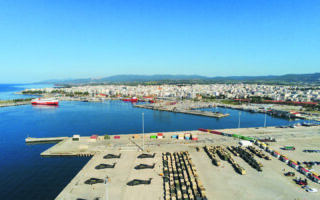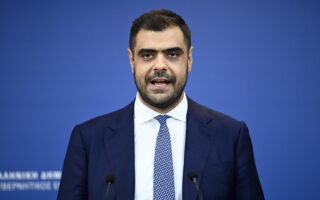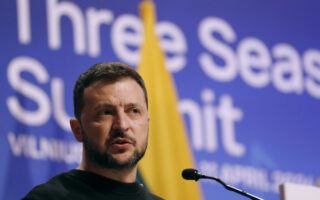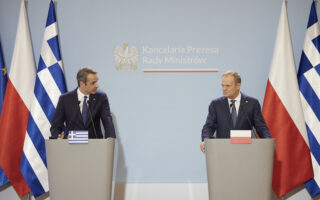Erdogan: Issues of sovereignty do not harm dialogue
Ahead of Greek PM’s visit to Ankara, Turkish president tells Kathimerini Greece and Turkey can discuss differences without any fait accompli
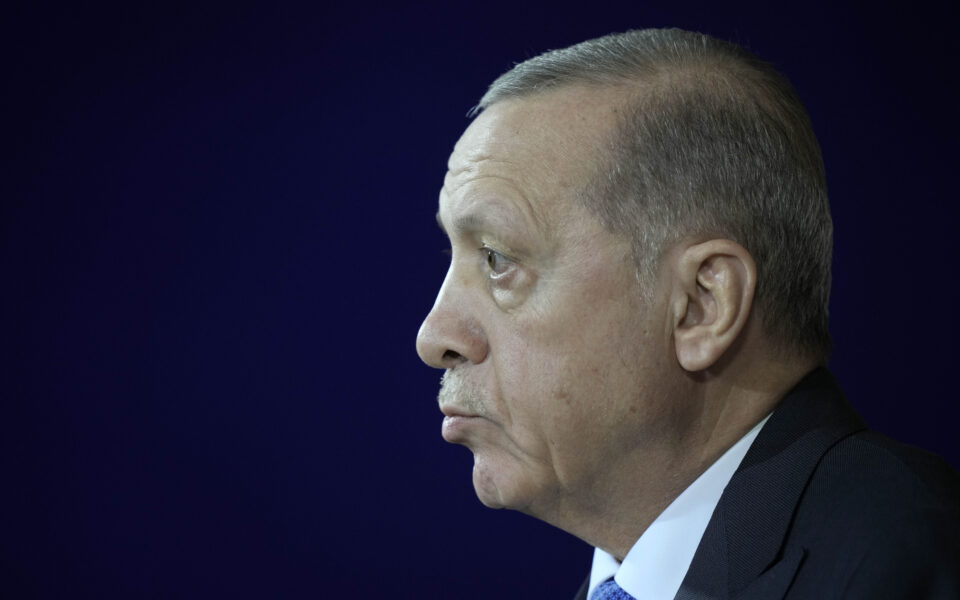
A few hours before welcoming Greek Prime Minister Kyriakos Mitsotakis to Ankara, Turkish President Recep Tayyip Erdogan spoke to Kathimerini about all the issues pertaining to the two countries’ bilateral relations: The old differences, such as the delimitation of the continental shelf and the Libya Government of National Accord (GNA) – Turkey maritime deal, as well as about the new ones that have arisen recently, such as Greece’s decision to establish a marine park in the Aegean Sea, on the occasion of which Turkey once again raised the question of sovereignty over the small, uninhabited islands. The Turkish president also answers questions about his country’s relations with the United States, after the postponement of his planned meeting with President Joe Biden which was set to be held on May 9.
Mr President, in your statement regarding the visit of Kyriakos Mitsotakis to Ankara, you mentioned that you will talk with him “about how relations between the two countries can be improved.” Are you satisfied with the level of bilateral relations? What is the goal and how can it be achieved?
The goal is simple: To consolidate our friendship and raise the level of our bilateral relations to a level unprecedented in history, by solving our problems. To this end, we in Turkey have recently taken sincere and effective steps and we intend to continue. We, Turkey and Greece, share not only the same geography but also many common elements with a historical dimension. Of course, there are issues on which we disagree, but the number of issues on which we can agree is not small. By speaking openly and courageously about all issues together we can take steps towards a solution. Procrastination doesn’t solve problems. It is necessary to overcome them with courage and show a will to resolve them. Just as we strive, with the world watching in awe, to establish peace both in our region and in different geographical locations of the world, so we will do everything in our power to ensure that peace and tranquility will always prevail on both sides of the Aegean Sea. It’s easy to destroy something. The hard part is building and solving problems with skill. Therefore, it is up to us to relax the relations between the two countries, which are trying to squeeze themselves between two walls, and to tear down those walls which are full of prejudices. All we need are solution-oriented and honest historical steps.
How was your meeting with Mitsotakis in Athens? Is your communication with him at the level you desire?
I believe that we have achieved a climate of harmony with Mr Mitsotakis recently. They showed a hospitality that satisfied us in Athens. Of course, when we host Mr Mitsotakis in Ankara, we will demonstrate one of the rarest examples of Turkish hospitality. The climate I mentioned has started to bear concrete results. The Athens Declaration, the agreements and protocols we signed are just some of them. There is no barrier to adding new ones. I can say that very good relations have been established not only between us, but also at the level of ministers and bureaucrats. In conclusion, our communication is satisfactory on many levels and it is very likely that we will move forward in a positive way.
Recently, Ankara reacted to the steps Greece wanted to take regarding the creation of two marine parks in the Ionian and Aegean seas. While Athens says this is an environmental matter, Turkey’s Foreign Ministry raised the issue of “island sovereignty.” Mitsotakis stated that Greece will move ahead with the plan. Can bilateral dialogue move forward when questions are raised not only of exploitation rights in the sea but also of sovereignty over land?
Raising issues of sovereignty is not something that damages the grounds of dialogue and hinders its progress. We can protect this ground under any circumstances and ensure progress. These matters already have a special place on the list of issues that we have to deal with. We can discuss these issues with a perspective that is far from any fait accompli and adopt an approach that believes in the solution. Everyone knows how sensitive we, as Turkey, are on the environment. However, it would be wrong to see this as a convenient screen for hiding other controversial situations behind it. Each issue must be viewed in its own context. Indeed, the Law of the Sea encourages cooperation among coastal states in enclosed or semi-enclosed seas such as the Aegean, among others, on environmental issues. On the other hand, everyone knows that Turkey will not accept de facto situations in this region.
Greece considers the agreements signed between Turkey and Libya (GNA) invalid and Turkey considers the agreements between Greek and Egypt regarding the partial demarcation of the sea boundaries invalid. Likewise, a number of agreements between Cyprus and Israel are considered invalid by Turkey. In such an environment, can we talk about any cooperation between Greece and Turkey on the exploitation of hydrocarbons?
Let’s start by making a correction. In your question you mentioned an agreement between Cyprus and Israel. It is only an assumption that the entire island of Cyprus has signed an agreement delineating its maritime exclusive economic zone with Israel. This agreement, which we do not recognize, was signed between the Greek administration of southern Cyprus and Israel, while the rights and interests of Turkish Cypriots, who constitute an essential element of the island, i.e. of the Turkish Republic of Northern Cyprus, have been ignored.
On the other hand, for us, energy is not an area of conflict, but an area of cooperation. For this reason, approaching the subject from a positive angle is more than enough. Turkey has consistently advocated and consistently called for a fair and inclusive distribution of hydrocarbon resources. As in all matters, we want our sovereign rights and powers to be respected, as we also respect the rights and principles of coastal countries. However, we have always shown the necessary reaction to any attempts to ignore Turkey. In addition, we have made an open call and stated that a basis for an inclusive energy cooperation must be created and that we will support the steps to be taken for it.
Everyone should know that it is difficult for an energy platform that does not include Turkey to succeed in the region, especially in the Eastern Mediterranean. By convening the Eastern Mediterranean conference that we have been talking about for years, it is possible to create a basis for a solution with a win-win approach.
Unfortunately, our appeals on this matter have so far gone unanswered. I have emphasized at every opportunity that this proposal, which has significant potential to ensure a healthy dialogue in the region, should be adopted by other actors as well. I think such a step will facilitate cooperation, and contribute to the diversity and security of resources. Unfortunately, steps that ignore the rights of Turkey and the Turkish Republic of Northern Cyprus have poisoned the atmosphere on this issue so far. If we abandon this and create the grounds for dialogue that we desire, we are ready to take responsibility for a permanent solution. You can’t get anywhere with tension. It should be understood that getting caught up in provocations benefits no one and ways should be sought to reach a reasonable point.
The positions of the two countries on the subject of the Aegean continental shelf are well known. No change in the attitude of the two countries is expected. Would you accept the mediation of an institution such as the International Court of Justice in The Hague to resolve the long-running dispute?
The solution here is clear, the solution is to comply with international law and make it viable. As long as we don’t avoid it, there shouldn’t be any obstacles we can’t overcome together. As you know, we advocate that problems should be solved as a package. We should not ignore other controversial points by focusing on a single difference. When we say that we have arrived at a comprehensive solution, we must not pass down frictions to future generations. Our priority is clear. Our approach to finding solutions through peaceful means in accordance with international law is the key to eliminating problems. We do not rule out solutions inscribed in the UN Charter, if necessary. We express this clearly at every opportunity. As long as we are not saying, “Let’s solve this problem while the others remain unsolved,” and let’s face the problems together.
‘Opportunities for mutual gains’ from a ‘win-win’ diplomatic approach
More than a year has passed without tension in and over the Aegean Sea. Do you agree that the abstention from military action can and should be maintained, regardless of any progress in the bilateral disputes?
As we say, it is always important to maintain the basis of dialogue and cooperation. We are not in favor of tension. Just as we have no designs on the rights of others, we do not want anyone to show disrespect for our rights. Continuing a behavior that respects sensitivities ensures that an atmosphere without tension prevails; we experienced this together. This calmness is a sign of how necessary it is for relationships to develop on a fair basis. We do not hesitate to extend a hand of friendship as long as there is a response. We value friendship and good-neighborly relations. As long as no steps are taken that can harm us, this attitude will continue.
What is your opinion on the level of cooperation with Greece in controlling illegal migration?
In this area, the contacts and exchange of information between our authorities produced important results and this continues. On the other hand, as we always emphasize, in the issue of irregular migration there must be international cooperation and an equal distribution of burdens and responsibilities. For permanent solutions, it is obvious that we must continue to work with a multifaceted scheme. The cooperation of all those involved in the matter will pave the way for us to move forward on a fast, efficient and sound basis.
The implementation of the tourist visa for Turkish citizens is already yielding amazing results. Do you think there are other areas of economic cooperation that can be mutually beneficial?
Our basic approach to diplomacy is the win-win principle. Turkey and Greece are two important tourism countries. Our citizens have the opportunity to easily travel to the Greek islands by applying for a visa at the gate. In fact, all this should not be necessary and the European Union should liberalize the visa regime for Turkey. We want to make progress on this matter. We believe there are areas where we can have mutual benefits with Greece, such as visa at the (entry) gate. When we approach issues with a positive agenda, we can make progress in many areas, especially in our trade relations, and bring benefit our countries. For example, the abolition of quotas applied to road transport vehicles and the liberalization of the transit regime can allow us to more easily achieve our goals by increasing our trade volume very quickly. The win-win principle is not just in words, we are honest and have successfully passed the honesty test in this matter dozens of times. When we see an honest approach in front of us, it will be very easy to create new opportunities for mutual gain.
In the more than 20 years you’ve been in power, which moments would you identify as the best and the worst in Turkey-Greece relations?
Here, I would like to refer to positive issues and express them… But to answer your question, after the treacherous coup attempt of FETO [Editor’s note: The network of Fethullah Gulen] and the coup attempt that took place in our country on July 15, 2016, the terrorists sought refuge in neighboring Greece and Greece protected and harbored the coup plotters, despite the bonds of neighborliness and the alliance between us. This can be considered one of the lowest points in our relations. This didn’t hurt only me; it hurt our people, who resisted with their own hands and repelled the coup plotters, purportedly from the military, by writing an epic of democracy. It was deeply disappointing that Greece, which understands the gravity of coups through its historical experiences, adopted such a stance.
The Athens Declaration, signed last December, possibly represents a pinnacle in our relations. The declaration marked the dawn of a new phase in our relations. Of course, we do not view this as adequate and strive for further improvement. I believe this declaration will serve as the foundation for revitalized Greek-Turkish relations, aspiring to set new benchmarks.
There are views expressed that the reopening of the Theological School of Halki would be a positive step for Turkey regarding religious freedoms. The school has remained closed for decades, and you have been in power for 22 years. Do you intend to take any action on this matter?
Our position on this matter is clear. We hold a deep respect for the rights of minorities, and our sensibility towards this issue is profound. The Greek Orthodox minority in our country benefits from both the right to equality as citizens and minority rights. The issue surrounding the Theological School of Halki emerged in 1971 when all private higher education institutions were nationalized under a decision by the Constitutional Court. With no tertiary education institution available for the transfer of the Theological School, the legal basis was compromised. The Patriarchate opposed the proposal to integrate the school’s operations within a state university under the legislation of the Higher Education Council. Efforts persist to reopen the Theological School of Halki. We anticipate a similarly constructive approach from our neighbor regarding the challenges faced by the Turkish minority in Greece in the realm of education.
The role of the US
Why was your scheduled meeting with President Biden suddenly postponed? Do you believe the United States should play a mediating role in Turkish-Greek relations?
Our visit to the USA was postponed due to conflicting schedules on both sides. As you know, the United States is on the eve of elections, and Mr Biden’s schedule has become even busier. Our programs continue intensively both domestically and internationally. Such visits are scheduled when suitable for both parties. Efforts are under way to determine a suitable date, with our friends, engaging in discussions with their counterparts. We advocate for maintaining a political balance in US relations with Turkey and Greece. We believe that maintaining a distance in line with the rules of the alliance, fostering constructive dialogue, will be beneficial. Additionally, we have direct contact with Greece, with no need for intermediaries. Sustaining and developing this will make a positive contribution to our relations.
We would like to discuss the developments in Gaza. You have criticized Israel for its actions in Gaza, likening Benjamin Netanyahu to the “Hitler of our time,” and supported Hamas, which Israel and Western countries deem terrorists, as a “liberation movement.” Could you clarify Turkey’s stance on this issue?
Seeing what Israel has brought upon the people of Gaza for months, can one justify Israel’s bombings of hospitals, killing of children, oppression of civilians, and condemning innocent people to hunger, thirst, and lack of medicine under various pretexts as legitimate? Reflecting on history, what did Hitler do? He oppressed and killed people in concentration camps. Hasn’t Gaza effectively become an open-air prison, not only since October 7 but also for years prior? Haven’t the people there been condemned to limited resources for years, akin to conditions in a concentration camp?
Who bears responsibility for the most brutal and systematic mass murders in Gaza since October 7? How should we perceive Israel, which instructs people to “go to that area” and then bombs it? Netanyahu’s actions have reached a level that would make Hitler envious of his genocidal methods. We’re discussing Israel, which targets ambulances, strikes food distribution points, and fires upon humanitarian convoys. Dozens of rights and freedoms of Gazan residents are violated, particularly the right to life. We stand up for their rights. We advocate for peace.
Conversely, Israel recklessly flouts United Nations resolutions, international law, and human rights. Consider this: What would you do if someone entered your home and declared, “This place is now mine, leave”? Would you say, “come live in my house and take it away from me”? Or would you defend your home? Naturally, you would defend your home and resist injustice. Israel has done this not only in Gaza but in all Palestinian territories. It seized Palestinian homes and lands for terrorists it labeled as settlers. It placed them in Palestinian homes.
Faced with this systematic and long-standing oppression, Palestinians eventually organized and began to resist. Hamas and other Palestinian resistance groups, which the West is trying to label as terrorists, effectively emerged in response to this oppression. Hamas is nothing but people protecting their homes, businesses, and lands held by Israel in Palestine. What does Hamas seek? To reclaim Palestinian lands held by Israel and restore their state.
If a sovereign, independent, geographically contiguous state of Palestine were recognized within the 1967 borders, with East Jerusalem as its capital, would there still be a need for resistance? Furthermore, Hamas has stated that in such a scenario, it would dissolve its armed wing and transition into a political party. A two-state solution offers a viable path toward lasting and sustainable peace.
You see, in its latest statement, Hamas agreed to a ceasefire. But Israel does not want a ceasefire, citing excuses due to its desire to occupy all of Gaza. Hardship and bloodshed persist. We continue our pursuit of a solution. Those who support Israel must reconsider these events and align with those advocating for peace and tranquility, bearing a sense of historical responsibility.

